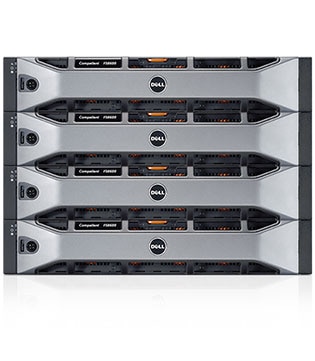Genel Özellikler
Teknik Spesifikasyonlar
Markalar ve Modeller
Genel Özellikler
Processor
- CPU per controller
Dual Intel E5620 4 core / 12MB L3/ 80W / 2.4GHz
Scalability
- Capacity scalability
Up to 4PB usable file capacity per NAS cluster, regardless of controller cluster size (requires multiple Storage Centers to reach max capacity)
Cluster scalability
Up to 4 FS8600 appliances (8 controllers) in a single NAS cluster
Connectivity
- 8Gb FC configuration options
Frontend and interconnect traffic (two options):
1GbE: (2) Intel 1GbE quad-port NICs per controller, copper only, RJ-45
10GbE: (2) Intel 10GbE dual-port NICs per controller, copper/optical, SFP+ standards
Backend: (1) QLogic dual-port FC HBA per controller, SFP+ standards
Switch is required; direct connect to the SAN is not supported
10Gb iSCSI configuration options
Frontend: (1) Intel 10GbE dual-port NIC per controller, copper/optical, SFP+ standards
Backend and interconnect: (1) Intel 10GbE dual-port NIC per controller, copper/optical, SFP+ standards
Switch is required; direct connect to the SAN is not supported; upgrades from FC to iSCSI or vice versa are not supported
Product Configurations
- FS8600 with FluidFS version 5 Specifications
Storage arrays supported
SCv2080, SC4020, SC8000 and SC9000 controllers
SCOS 6.5.3 or newer; Enterprise Manager 2015 or newer
Technical Highlights
- NFS v3 file protocol support
NFS over UDP and TCP, Kerberos 5 security options, UTF8 and ASCII support, NLM
NFS v4 file protocol support
Kerberos 5 security options, UTF8 and ASCII support, pseudo file system, locking, share modes and access control lists (ACLs)
NFS 4.1 file protocol support
Core features (no pNFS support), Kerberos 5 security options
SMB file protocol support
SMB 1.0, 2.0, 2.1 and 3.0
Persistent file handles, continuous availability, SMB signing and encryption (MD5 and HMAC-SHA-256), large MTU, file leases and oplocks
Network protocols
Full support for client IPv6 and IPv4 connections, including load balancing mechanism and access control for NFS exports, LACP
NAS volumes
Max NAS volumes per NAS cluster: 1,024
Max NAS volume size: as large as the file system
Shares/exports
Max number of CIFS shares per system: 1,024
Max number of NFS mounts/exports per system: 1,024
Concurrent active CIFS connections
Max for single appliance: 30,000 (for 48GB appliances)
Max for a 4-appliance cluster: 120,000
("active" defined as clients engaging in I/O in the last 15 minutes)
User authentication
For CIFS clients: Kerberos 5 and NTLMv2 on Microsoft Active Directory Server
For NFS v4, 4.1 clients: Kerberos 5
Directory and name services
Windows CIFS and NFS clients: Microsoft Active Directory 2003, 2003R2 2008R2, 2012
Linux/UNIX clients: NIS, LDAP, DNS
Max quotas
Max quota rules per volume: 1,024
Max user quotas per system: 1,024
Local users
Max number of local users per cluster: 100
Max number of local groups per cluster: 100
Directories
Max number of directories per appliance: 32 billion
Max number of directories per 4-appliance cluster: 128 billion
Max number of files in a directory: 1 million
Max directory depth: 255
Files
Max file size: 16TB
Max number of files per appliance: Unlimited
Max number of files per 4-appliance cluster: Unlimited
Max file name length: 255 bytes
Snapshots
Redirect-on-write snapshots and thin volume cloning
Max number of snapshots per NAS volume: 10,000
Max number of snapshots per FS8600 system: 100,000
Max number of snapshot policies per system: 1,024
Replication
Asynchronous to peer FS8600 appliance(s), (client network speeds and array configurations can vary)
Max number of replication partners (or destinations): 100
Max number of replication policies per FS8600 system: 1,024
Max number of simultaneous volume replications: 10 outgoing, 100 incoming
Max volumes enabled for replication: 1,024
NDMP backup
Remote and three-way NDMP over Ethernet ports (backup over backend Fibre Channel not supported)
Certified with Quest NetVault Backup 9; CommVault Simpana 9.x; Tivoli Storage Manager 6.3; Symantec NetBackup 7.x and Backup Exec 2010R3 and 2012, EMC Networker 8.0
ICAP antivirus
Certified with Symantec ScanEngine 5.2 and Protection Engine 7.0; McAfee Virus Scan Enterprise 8.8 and Enterprise for Storage 1.0.2; Sophos Endpoint Security and Control 10.0; TrendMicro InterScan Web Security
Suite 3.1
Thin provisioning
File-level and block-level NAS volume- or file system-level thin provisioning to oversubscribe the file system capacity visible to users
Data reduction
Post-process policy-based variable block (128KB +/- 64KB) data deduplication and LZPS compression configured per NAS volume
Management
- Dell Storage Manager, FluidFS v5 CLI, PowerShell, RESTful API, SNMP, MMC
Chassis
- Form factor
2U
Height
8.64 cm (3.4 in)
Width
44.63 cm (17.6 in) (does not include rack flange)
Depth
81.30 cm (32.0 in) (includes bezel and controllers installed)
Weight
69.5 lbs. (31.5 kg)
Rack support
ReadyRails II static rails for tool-less mounting in 4-post racks with square or unthreaded round holes or tooled mounting in 4-post threaded-hole racks
Power
- Primary power supply
2 PSUs per appliance
Backup power supply
1 battery per controller, 2 batteries per appliance
Input voltage
90-264 VAC
Output wattage
717W
Heat dissipation
2446 BTU/hr
Line frequency
47-63 Hz
Current
10.5Amp at 90 VAC steady state, 5.2Amp at 180 VAC steady state
Environmental Operating Conditions
- Temperature
Operating: 10° to 40°C
Non-operating: -40°C to 70°C
Relative Humidity
Operating: 8% to 85% non-condensing
Non-operating: 5% to 95% non-condensing
Maximum Vibration
Operating: 0.26 GRMS (5-350Hz @ 0.0002G2/Hz for 5 minutes)
Non-operating: 1.88 GRMS @ 10-500 Hz
Teknik Spesifikasyonlar
High rack density and low cost per GB
Dell Storage Center with FS8600 and SCv2080 storage arrays offer ideal rack density for storage-intensive workloads, providing:
- Best storage density compared to the top five storage vendors, storing 1PB of raw capacity in 14U rack space2
- Low cost per GB of USD $0.18/GB for 1PB of raw capacity3
- Increased efficiency with scale-out architecture, flash optimization, automated tiering and built-in policy-driven, block-level deduplication and compression
- Unencumbered capacity with NAS thin provisioning and space reclamation




